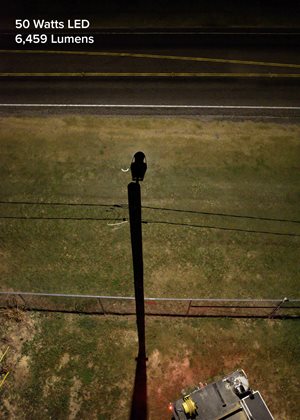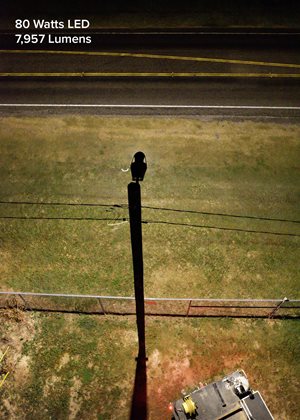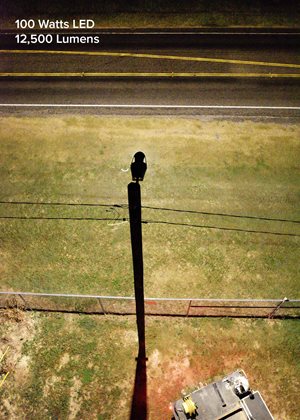Outdoor Lighting
From rural ranches to urban neighborhoods, lighting your home properly is a priority. BEC is here to help install, repair or replace outdoor security lights. BEC offers
Dark-Sky Compliant and Approved, LED outdoor lighting which produces down light, enhancing your Hill Country stargazing while saving energy.
New outdoor light installation or removal requires a $125.00 installation/service fee.
To request outdoor lights, simply complete the application below.
LED Lights*
LED lights are the next evolution in lighting technology. They are more energy efficient and require less maintenance compared to other outdoor light sources. Because they produce down light, they enhance Hill Country stargazing. The life expectancy of an LED outdoor light is around 15 years, which makes for a great option for our BEC members.
| 50 Watts LED |
$11.20 Monthly |
| 80 Watts LED |
$12.32 Monthly |
| 100 Watts LED |
$15.68 Monthly |
*Rates effective August 1, 2023.
High Pressure Sodium Lights*
| 100 Watts HPS |
$13.94 Monthly |
| 250 Watts HPS |
$22.24 Monthly |
| 175 Watts MV |
$13.53 Monthly |
| 400 Watts MV |
$22.24 Monthly |
| Energy Charge |
None |
*HPS rates apply to existing customers only.
Choosing The Right Outdoor Light


 The product images shown are for illustration purposes only and may not be an exact representation of the light brightness.
The product images shown are for illustration purposes only and may not be an exact representation of the light brightness.
| Light Type |
Brightness |
Recommended Use |
| 50 Watts LED |
6,459 Lumens |
Residential |
| 80 Watts LED |
7,957 Lumens |
Residential/Street/Driveway |
| 100 Watts LED |
12,500 Lumens |
Commercial/Street/Parking Lot |
| 100 Watts HPS |
9,500 Lumens |
Commercial/Street/Parking Lot |
| 250 Watts HPS |
27,500 Lumens |
Commercial/Street/Parking Lot |
HPS lamp vs. LED lamp
The high pressure sodium (HPS) lamp was invented in the mid-20th century. It has a short lifespan of 24,000 hours, and is highly inefficient. Today, HPS lights are slowly being phased out and replaced with new Light Emitting Diode (LED) lamps whose lifespan is an unbeatable 50,000 to 100,000 hours and use less than half as much energy.
Watts vs. Lumens
A watt is used to measure the amount of energy used. The higher the wattage, the more energy you are using, and therefore more cost you incur. A lumen is a measurement of brightness of a light bulb—the higher the number of lumens, the brighter the light bulb.
Replacing HPS with LED
While you may think that replacing a 100 watt HPS lamp with a 100 watt LED lamp is the same, it isn’t. It’s important to first consider the amount of light you want for your light’s location. For a brighter light, choose a lamp with more lumens. For a dimmer light, choose a lamp with fewer lumens. Remember to think lumens, not watts.
BEC recommends replacing a 100W HPS light with a more efficient and equally bright 80W LED outdoor light. If you previously had a 250W HPS light, we recommend a 100W LED.
- If the location of your outdoor light is next to your home, we recommend choosing the 50W LED.
- If you’re looking to light up your driveway, gate, or subdivision entrance, we recommend the 80W LED.
- If you are looking to illuminate a parking lot or have commercial use for outdoor lighting, we recommend the 100W LED.
Light Pollution
Light pollution occurs in different ways including light trespass (light spill), sky glow, glare, and light clutter. It affects the environment as carbon dioxide is released into the atmosphere. The
International Dark-Sky Association states that each year, about 12 million tons of carbon dioxide are released by invasive nighttime lighting. The association also estimates that 30% of all street light is wasted.
Light pollution also affects the lifestyle of mammals, birds, amphibians, and insects by causing disorientation and affecting their migration, sleeping, mating, and feeding cycles. LED technology has addressed the light pollution problem by developing light fixtures that focus light only where it is required.